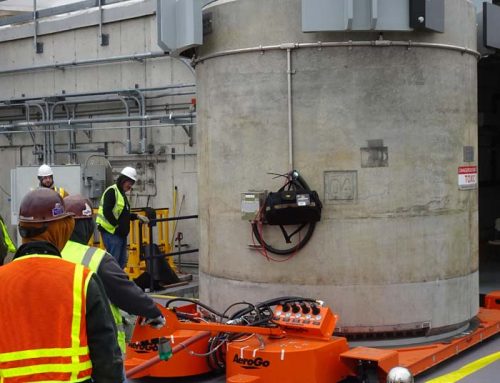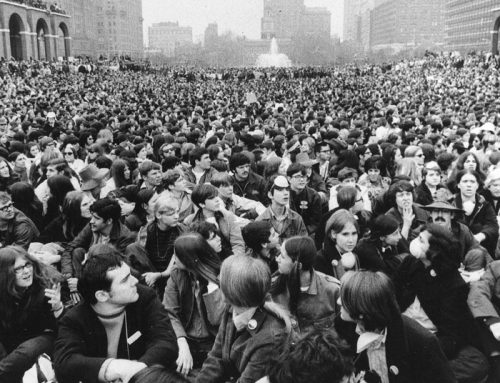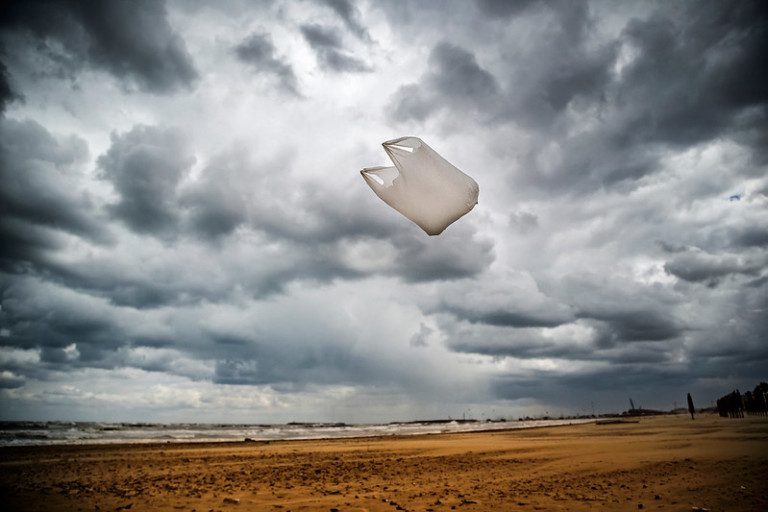
New Bag Ordinance in Hood River – Bring reusable bags to the store starting March 1st.
By Miko Ruhlen. Jan. 13, 2017. On January 9, 2017 Hood River City Council voted unanimously to adopt Ordinance 2030 to impose restrictions on the distribution of single-use plastic bags and certain paper bags within the City’s retail establishments.
“Too many single-use plastic bags are released or find their way into the environment,” the ordinance states, “…plastics, including plastic film bags, is a significant form of environmental pollution that is demonstrably harmful to wildlife.” The Council listed other adverse impacts of plastic bags: damage to sorting and processing machinery in resource recovery, and consuming raw material and energy in the manufacturing and waste disposal of bags. The Council also states in the document that it seeks to “encourage the use of reusable bags for day-to-day shopping.”
Starting March 1, 2017 for large Hood River retailers (50 or more full-time employees) the ordinance states that “retail establishments shall not provide or make available single-use plastic carryout bags or non-recyclable paper bags.” Smaller retailers (less than 50 employees) will have to comply with the same rules as larger ones beginning July 1, 2017. This ordinance does not affect businesses that primarily prepare food and beverage, or retail stores outside of Hood River City limits.
Although commonly known as a ‘plastic bag ban,’ Ordinance 2030 also restricts larger paper bags. Retailers will be required to charge a minimum of 5 cents per bag for the typical handled paper bags used at check out at most grocery stores. These bags are referred to in the ordinance as ‘barrel-sized’ paper bags (approximately 12 inches wide x 7 inches deep x 13-18 inches tall or a capacity of 1,100 to 1,600 cubic inches). These barrel-sized paper bags will also need to be 100 percent recyclable and contain a minimum of 40 percent post-consumer waste.
Although the ordinance specifies that 5 cents is the minimum, retailers may charge more. Steve Morgan, manager of Hood River Rosauers said in an interview that they will only charge 5 cents per bag.
Not affected by the ordinance are small paper bags, paper ice cream bags, paper wine bags, or plastic produce, meat, and bulk food bags. Large paper bags given out by small retail shops that have the same capacity as barrel-sized bags, will also have a 5 cent fee and meet recycling requirements.
The ordinance only applies to stores within the City of Hood River. Although stores outside Hood River City limits will still be able to give out single-use plastic bags, the ordinance will greatly reduce the quantity given out in the area. Approximately 700,000 single-use plastic checkout bags were given out per year by Rosauers in Hood River at a cost of approximately 4 cents each in 2008 according to previous store manager Kevin Harris (Hood River News article March 26, 2008 by Susan Hess). The current manager, Morgan, confirmed that that is likely still a pretty close estimate of current use and cost.
Mayor Blackburn said citizens and businesses have mixed opinions about the bag ordinance. He said the most interesting comment he heard was from a Rosauers employee who said, “We’ve been expecting this. We’ve been waiting to be told.” Blackburn mentioned that one local retailer told him in response to the potential 5 cent fee, “that it could cost them 11 times that (5 cents) to give away a large paper bag,” and that this ordinance will give them an avenue to recoup some costs rather than having to implement fees for bags unilaterally.
Reusable bag availability is also required by this ordinance. All retail shops “must make reusable bags available at a reasonable cost to all customers.” When asked if the ‘Take a bag, leave a bag’ program that a local volunteer student group started at several area grocery stores would fill the requirement, he said it would “assuming the bin of bags wasn’t empty half the time.”
Retailers could be fined a minimum of $200 for each offense if they violate the ordinance. This fine would be per ‘reported violation’ according to Hood River Mayor Paul Blackburn. Although enforcement details are not yet mapped out and are somewhat discretionary, Blackburn expects that most of it will be in response to complaints and follow up compliance visits with warnings given out before the $200 fee is assigned.
Many people in Hood River County have been pushing for this environmental measure for months or years including some youth at Wy’east Middle School who wrote essays to the City Council, Hood River News, and EnviroGorge. Others are concerned about the impact to their business practices and will have to work on ways to adjust while keeping customers happy. It is clear that many businesses and most consumers in Hood River will have to adjust their bag purchasing and bag-toting habits starting in March of this year.











So happy to see this becoming reality! It is a good thing for the environment in more than one way! Thank you, City Council!
It’s about time. My husband and I lived in Germany for a couple of years back in early 2000. It was the norm to bring your own bags. It was also the norm that college was paid for and health care was free. The list goes on and on. Why can’t we learn from some of these other countries? Don’t get me wrong I love my America but we are slow on the learnin’…
It is puzzling as the citizens of those countries live well.
How does this effect second hand stores or nonprofits. We re-use donated paper and plastic bags for the customer sales. We love the big paper grocery bags.
Sally, we’ll try to find out the answers and get back to you.
See reply we posted to you on your facebook comment.
Sally, It says 50 or more employees. That won’t affect most of the smaller retailers in Hood River
Reading the document, it does affect small retailers. They just have a July start date rather than March.
The fine for failure to comply doesn’t affect the retailer. It is imposed upon the store management or owner with “a minimum fine of not less than $200 for each offense” (See Bag)
Since it wasn’t cited in the article http://ci.hood-river.or.us/pageview.aspx?id=42734
8.15.050 – Enforcement and penalties.
1. Responsible Party. A person who is in charge or in control of a Retail Establishment or who exercises authority over a Retail Establishment that is not in compliance with this Chapter 8.15 shall be liable for any violations of this Chapter.
Thank you for the clarification on the fine. We are working on a follow up story with more info and a correction that smaller paper bags given at checkout will need to be 40% post consumer waste and reusable bags must be sold at stores as well. It will be posted soon.
I cringe as I walk into our grocery stores & see someone coming out with a shopping cart full of plastic bags. We’ve been in Hawaii where they’ve banned plastic. It works! Backpacks, string bags, bags from many places work great. Buy one at the library & support library activities!
My husband and I have been training ourselves for several years to remember our reusable bags. If we forget our bags, we don’t get a bag! We load all our items back into the cart at checkout and then into the car or if the bags are in the car, directly into the bags. It’s a great incentive to remember the bags. I also have been gifted reusable bags from my children’s travels. I’d love to see some beautiful Hood River bags available for purchase.
Every new, petty law causes the citizens of this country to lose the freedom to choose for themselves. This is legalism to the maximum. We can have abortion on demand and kill innocent life inside of a mother but we can’t use plastic bags. Something is a little off.
Nice to see Hood River turn into Portlandia East, with all the usual symbolic “progressive” BS.
Will this apply to small retail clothing shops in Hood River as well, or is it just grocery stores?
The Bag Ban applies to larger stores (50 or more employees) starting March 1 and all other retail stores in Hood River City limits starting July 1 regardless of size. It does exclude stores engaged primarily in food preparation.
We have posted a follow up article with a few clarifications and also more explanation about the reasons for the 5 cent bag fee. https://columbiainsight.org/ready-set-bag/